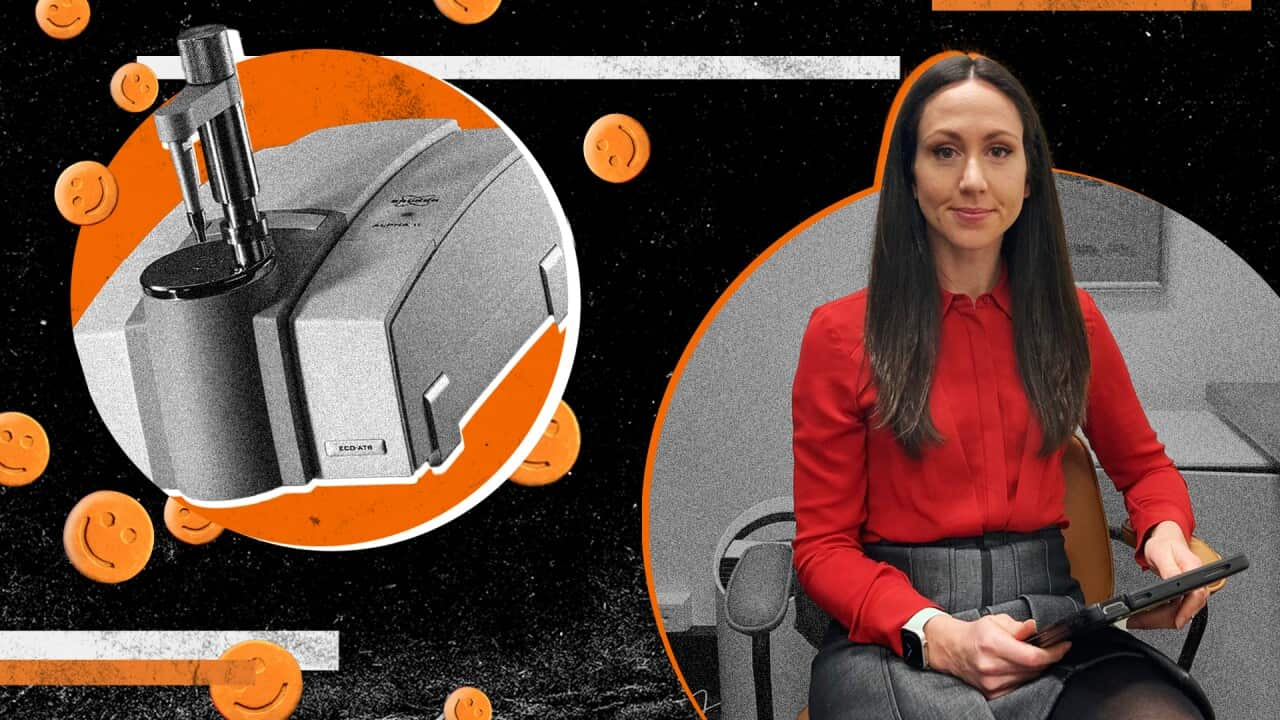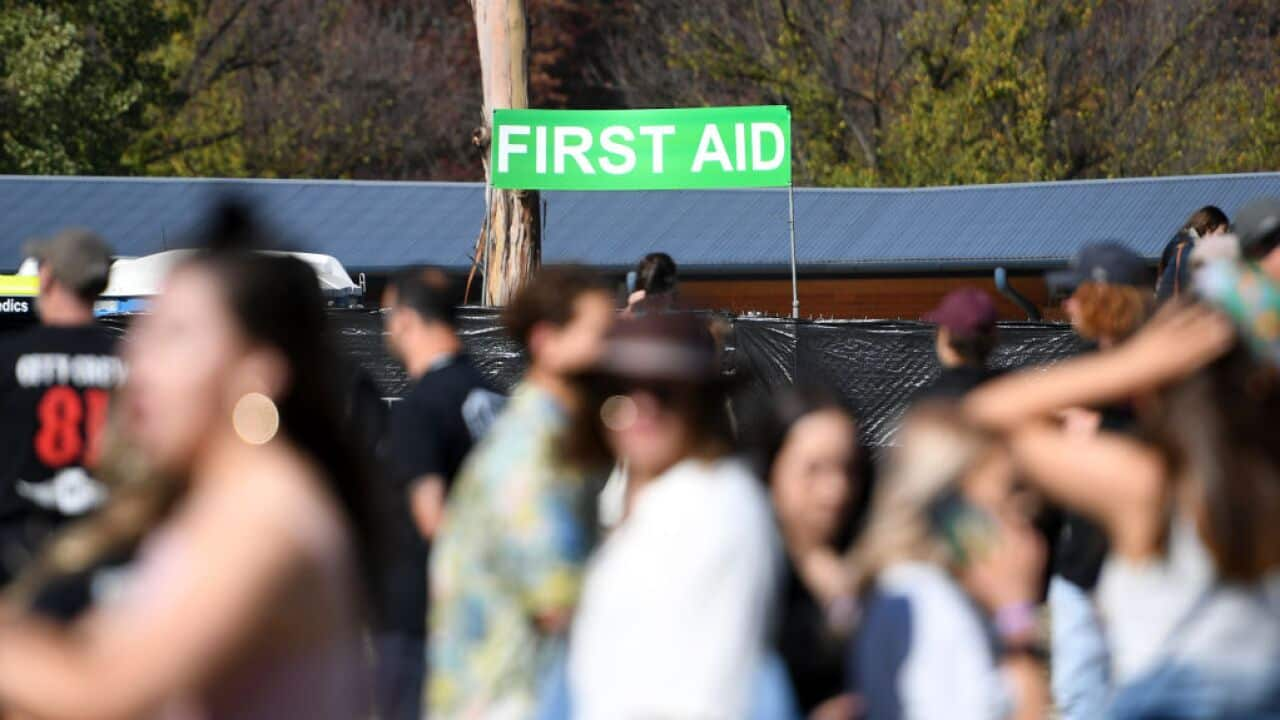Key Points
- Ever wondered what's inside party drugs?
- We went behind the scenes of Australia’s first drug testing clinic in Canberra
The results from the first month of Australia’s first fixed-site drug testing clinic, CanTEST, are in.
During a six-month pilot program which started in Canberra in July and aims to minimise harm associated with drugs, people can bring in small amounts of any drug to have them tested without fear of being arrested. And initial results are showing that the illicit drugs people are buying may not always be what they seem.
Stephanie Stephens, the clinic’s manager, told The Feed that of the 56 drug samples tested in the first month, 18 were thrown away after people found things in them they didn’t want to take.
“A lot of MDMA that wasn’t MDMA, often it was another drug like methamphetamine (ice) or it was cut with other fillers like cornflour, sugar, salt or caffeine,” she told The Feed.
“Caffeine might sound safe, but in the doses, we’ve found and when it’s mixed in with other substances there is a high risk of overdose.
“There have also been times when people have thought they had a depressant but it turned out to be a stimulant, which can be quite a distressing experience for people if they ingest the substance.”

Of the five cocaine samples tested in the first month, only three contained cocaine. Of those, no sample had a purity level higher than 27 per cent.
There were 19 MDMA samples tested, with only 13 containing MDMA. Of those 13, the purity range was between 23 and 73 per cent.
There were six heroin samples tested. All of them contained heroin, with purities ranging from 31 to 63 per cent.
The clinic also tested four samples believed to be methamphetamine, also known as ice. The drug was detected in three samples and the fourth one contained no methamphetamine, only sugar.
“Some people are really quite disappointed and shocked that they've gone and spent a few hundred dollars on what they thought was MDMA, and they've just got filler, '' Ms Stephens told The Feed.
“Other people have been quite upset by the risk that they could have just exposed themselves to.
“Others have been able to confirm their drugs are what they thought they were and are really grateful to have that knowledge.”
How does the drug testing work?
The free and confidential service was opened by the ACT Government and is run by Pill Testing Australia, the Canberra Alliance for Harm Minimisation and Advocacy as well as Directions Health Services, a drug and alcohol support service.
Clients are asked to place mobile phones in lockers while they attend to ensure the confidentiality and privacy of all those in the clinic. When people bring in drugs, they are asked about what substance they are bringing in and what their intentions around using the substance are.

The Fourier Transform Infrared Spectroscopy (FTIR) machine used to identify drugs in samples at the clinic
People have the option to do a second, longer test that can identify the other compounds and purity of the substance.
It takes anywhere from five to 20 minutes to receive results, and people are offered a counselling session with an alcohol and drug counselor when the results come through.
The clinic also provides testing for fentanyl, a powerful synthetic opioid, as well as sexual and mental health consultations.
Will I be arrested going in there with drugs?
No. The clinic has been set up in conjunction with the ACT police.
Bronwyn Henry, the CEO of Directions Health Services, told The Feed that ACT Police recognise it’s a harm minimisation initiative.
“We’re also telling people to only bring a small amount of a drug to get tested, no more than one pill or a gram of powder,” she said.
“Our location is inside a health clinic and we have other health services here so people could be coming in here for a variety of different reasons.”
How is this different from pill testing at festivals?
Associate professor David Caldicott is the clinical lead at Pill Testing Australia, an independent organisation that provides research and infrastructure for pill testing at festivals.
Dr Caldicott was involved in Australia’s only other pill testing trial that took place at the Groovin The Moo music festival in the ACT in 2018 and 2019.
He told The Feed that having a drug testing service in a fixed location improves access to the service as there isn’t the financial barrier of needing to purchase a ticket, which can cost hundreds of dollars, to have access to pill testing services.
“We can deploy some much more sensitive equipment too as you can imagine in a festival you need really robust tools to survive in a festival environment,” he said.
“We're also providing information to people who inject drugs. They're a very important group of people, and there are some very significant potential adulterants that we're looking for - namely fentanyl - within the heroin market.”
Dr Caldicott said another objective of this trial is to learn more about the drug market in Australia and potentially identify bad batches of substances in circulation.
“It’s hard to extrapolate directly from overseas experience but in the Netherlands where these kinds of services have been around for 20 years, we’ve seen it introduce a level of consistency in the drug market,” he said.
“Dealers become aware of the fact that the people who they're providing product to, have a mechanism for identifying what's in that product.
“So we do see changes in the market as a consequence, and they're certainly not more dangerous, they're probably less dangerous products come on the market as a consequence.”

Between 2016 and 2019 there were eleven drug-related deaths in Victoria and NSW.
In Victoria, five young men consumed what they believed to be MDMA and magic mushrooms but turned out to be a cocktail of synthetic psychoactive substances 25C-NBOMe and 4-Fluoroamphetamine.
In NSW a cluster of six deaths occurred at music festivals where all were consuming MDMA.
Both clusters resulted in coronial inquests in both states that recommended fixed-site drug testing clinics among other harm minimisation strategies.
Since the coronial inquest’s recommendation, there have been calls for the NSW government to allow pill testing to go ahead but there has been resistance.
The Feed asked NSW Police Minister Paul Toole why pill testing has not been conducted in the state.
“Pill testing sends the wrong message to people about consuming illegal substances - there’s no such thing as a safe way to take these drugs and we don’t want to create a false sense of confidence that there is,” he told The Feed.
“Tragically, too many families are living with the consequences of people thinking there is.”
Dr Caldicott told The Feed there is nothing about what they do at CanTEST that says drug use is safe.
“Right at the get-go, we tell them that the only way to be safe as far as drug consumption is concerned is not to take drugs.
“What I'm hoping is that young people will take our advice well, and when they find themselves in possession of products that we tell them are dangerous, they modify their behaviour as they have done in the festival world.”











